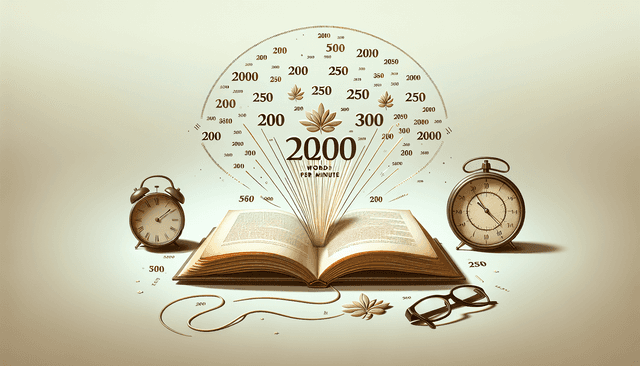Table of Contents
Have you ever wondered how long it takes to read 10,000 words? You’re not alone! Many people think about their reading speed when diving into a new book or article, especially when faced with such a specific word count.
If you stick with me, I’ll help you understand the factors that impact your reading speed and how to estimate the time it takes to get through 10,000 words effectively. You’ll also find some great tips to improve your reading skills!
We’ll explore everything from average reading speeds to practical scenarios, so you’ll feel more confident tackling any text ahead of you. Let’s jump in!
Key Takeaways
- Reading 10,000 words typically takes between 33 to 50 minutes, depending on your reading speed (200-300 words per minute).
- Your familiarity with the topic, text complexity, and environment significantly affect how fast you can read.
- Practicing techniques like skimming and chunking can help improve your reading speed.
- Using tools like speed reading apps and reading journals can track progress and enhance comprehension.
- Understanding different reading scenarios, such as books, articles, or academic texts, helps you manage your time effectively.

Understanding Word Counts
Definition of 10,000 words
The phrase “10,000 words” refers to a specific word count that is often used to gauge the length of various written documents, such as essays, articles, or books.
This length can serve multiple purposes, from being a standard requirement for academic submissions to acting as a guideline for content creation in digital media.
Understanding how many pages or hours this word count translates into can help you efficiently manage your reading and writing tasks.
Common contexts for 10,000 words
10,000 words commonly appears in various contexts, such as short novels, research papers, and comprehensive articles.
In the realm of publishing, many short stories or novellas often fall within or around this word count, making it a popular length for experienced authors.
Academically, students might encounter a 10,000-word limit in coursework, dissertations, or thesis documents, necessitating effective strategies for both writing and reading.
Reading Speed
Average reading speed of adults
The average reading speed of adults typically ranges from 200 to 300 words per minute.
This range can vary based on many factors, including the reader’s proficiency and the type of material being read.
A basic understanding of one’s reading speed can be instrumental when approaching longer texts, such as those totaling 10,000 words.
Factors that affect reading speed
Familiarity with the topic
One of the primary factors that influence reading speed is familiarity with the topic being read.
When readers are acquainted with the subject matter, they tend to process the information more rapidly because they can rely on prior knowledge.
Engaging with new topics may require slower, more deliberate reading to comprehend and assimilate the material effectively.
Complexity of the text
The complexity of the text plays a significant role in determining how quickly it can be read.
Text that includes specialized vocabulary, intricate sentence structures, or abstract concepts often demands more cognitive effort, slowing down the reading pace.
Conversely, simple and straightforward writing enables readers to absorb information more efficiently.
Reader’s focus and environment
A reader’s focus and their environment are crucial elements affecting reading speed.
Distractions from surroundings—such as noise, interruptions, or visual clutter—can significantly hinder the ability to concentrate.
Creating an optimal reading environment—quiet and free from interruptions—can help enhance focus and, subsequently, improve reading speed.

Estimating Time to Read 10,000 Words
Calculating based on average reading speed
To estimate how long it will take to read 10,000 words, you can use the average reading speed of adults, which ranges from 200 to 300 words per minute.
If we take the lower end of 200 words per minute, it would take about 50 minutes to read 10,000 words.
Conversely, at 300 words per minute, the reading time would be approximately 33 minutes.
These calculations illustrate how much your reading speed can impact the time needed to tackle longer texts, making it helpful to know where you fall within this range.
Example with average speeds (200-300 words per minute)
For practical understanding, let’s break down the times using different reading speeds.
If you read at 250 words per minute, you would take about 40 minutes to finish 10,000 words.
This variation showcases how improving your reading speed can significantly decrease the time it takes to read lengthy documents.
Variations in reading time for different skill levels
Reading speed can vary greatly among individuals, often based on experience and strategies employed.
Some readers may find themselves capable of reading faster than average due to extensive practice or effective reading strategies.
On the other hand, less experienced readers may need to take their time to ensure comprehension, thus extending their reading time for the same text.
Being conscious of these differences allows readers to set realistic expectations and plan accordingly for reading assignments.
Practical Tips for Faster Reading
Techniques to improve reading speed
To enhance your reading speed, there are several techniques you can practice.
One effective method is skimming, where you glance through headings and key points to grasp the main ideas before diving into detailed reading.
Another technique is chunking, which involves reading groups of words together rather than word by word, allowing for quicker processing of the information.
Additionally, minimizing subvocalization—the habit of silently pronouncing words in your head—can lead to substantial speed improvements.
Tools and resources for tracking reading progress
Utilizing tools and resources can help track and enhance your reading progress effectively.
Apps like Blinkist offer summaries of books that can help you absorb key ideas quickly.
Moreover, speed reading apps such as Spreeder or Acceleread provide structured training programs designed to boost your reading speed and comprehension.
Keeping a reading journal can also assist in monitoring your reading habits and the time spent on various materials.
Real-Life Scenarios
Reading a book of 10,000 words
When reading a book of 10,000 words, the enjoyable aspect is often the narrative flow and immersive experience.
For most readers, finishing such a book can provide a sense of accomplishment in a relatively short period.
For instance, if you use a reading speed of 250 words per minute, you can complete it in about 40 minutes or so, making it a perfect short read on a quiet evening.
Reading online articles or blogs
Reading online articles or blogs can vary widely in content and style but often can be digested quickly due to their usually concise format.
For instance, many online pieces are between 600 to 1,500 words, meaning that reading several of these can allow for a comprehensive understanding of different viewpoints in a single sitting.
It can also be helpful to bookmark articles to read at a later time, ensuring that you don’t feel rushed and can enjoy the reading experience instead.
Reading academic texts
When engaging with academic texts, such as research papers or textbooks, the approach often changes due to the complexity involved.
Readers may need to pause frequently to take notes or reference materials, which can extend the overall time spent reading.
However, breaking down complex information into manageable sections can aid in comprehension and retention while facilitating a more efficient reading session.

Conclusion
Summary of key points
In this article, we’ve explored what 10,000 words means in various contexts, from academic writing to storytelling.
We’ve learned about average reading speeds and what factors can affect how quickly someone can read through a text of this length.
Time estimates show the importance of knowing your reading speed and how it influences comprehension.
We discovered practical tips to enhance reading speed, including skimming, chunking, and minimizing subvocalization.
Real-life scenarios reinforce how these skills can be applied across different types of reading materials.
Encouragement to practice and improve reading skills
Improving your reading speed and comprehension is a rewarding journey that can benefit both personal and professional life.
Start implementing some of the techniques discussed today and consider tools that can help you along the way.
With practice, you can transform your reading habits and enjoy a broader range of materials in less time.
So grab that book or article you’ve been wanting to read and apply what you’ve learned—your skills will grow with each page!
FAQs
Reading 10,000 words typically refers to completing a substantial piece of text, such as a short book, a lengthy article, or multiple articles combined. It’s a common metric for gauging reading material length.
The time to read 10,000 words varies by reading speed. At an average of 200-300 words per minute, it takes approximately 33 to 50 minutes to read this amount, depending on familiarity with the topic.
Factors affecting reading speed include familiarity with the subject matter, the complexity of the text, and the reader’s concentration level, influenced by their environment and potential distractions.
To improve reading speed, consider techniques such as skimming, using a pointer or finger to guide your eyes, and practicing regular reading to enhance your fluency over time.



